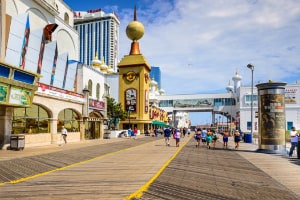
According to initial results, almost 78% of the votes cast in the November 8 referendum were against the plan. Associated Press projected that the ballot question had failed by more than a million and a half votes.
Casino expansion beyond Atlantic City has been discussed for years now but the issue became more pressing after 2014, when four gambling venues in the once-popular casino resort were shuttered for good.
Many believed that the construction of casinos outside Atlantic City would help the state’s struggling gambling industry improve its condition. Surrounding states have been expanding and upgrading their casino industries for the past several years, which has resulted in New Jersey losing customers and much-needed gambling revenue to its neighbors.
A bill that authorized the November 8 expansion referendum was signed into law earlier this year. Residents were asked to vote in support of or against the proposal for the establishment of two casino resorts in the state’s northern part.
Under the above-mentioned deal, operators of existing Atlantic City casinos would have been the first ones to be allowed to apply for licenses for the operation of the North Jersey gambling venues. And if no such operators had been interested in running a North Jersey casino, then other developers would have been allowed to bid for a license.
According to people with knowledge of the matter, that particular provision in the bill was among the main reasons for the ballot question’s failure. Major gambling companies would have probably spent more money on lobbying for the expansion proposal, if they had known that they would be allowed to apply for a license.
The casino expansion referendum was among the state’s most expensive ones in terms of money invested in lobbying for and against the proposed construction of new casinos. The amount of $24 million was shelled out solely on marketing campaigns that promoted the detriments that could be brought about by the proposed expansion. And as results show, those campaigning against the proposal have managed to strike a responsive chord with voters.
Opponents have argued over the past several months that the construction of North Jersey casinos would damage the state’s gambling industry beyond repair and that more Atlantic City closures would ensue from the expansion. In addition, they pointed to the fact that there were certain important questions that the November 8 ballot did not provide answers to. The amount of money the new casinos would have paid in tax revenue and their exact locations had been among those questions.
Although Atlantic City will maintain its monopoly over the state’s casino gambling for now, expansion proponents said early on Wednesday that they may revive discussions on the matter at some point in future.
Shortly after results were announced on Tuesday night, real estate developer Jeff Gural and Reebok Chief Executive Paul Fireman said in a joint statement that they were disappointed by that turn of events, yet it did not surprise them. Gural and Fireman had proposed to build luxury casino resorts at the existing Meadowlands Racetrack and in Jersey City, respectively.
Bill Cortese, Executive Director of Trenton’s Bad Beat, one of the groups lobbying against the proposed expansion, told media that they were happy with the overwhelming support their cause to prevent the establishment of North Jersey casinos had gained. Mr. Cortese attributed what he considered a great success to “a broad coalition of community leaders, unions, small businesses, and residents” who had comprehended the danger such an expansion presented to the state.















